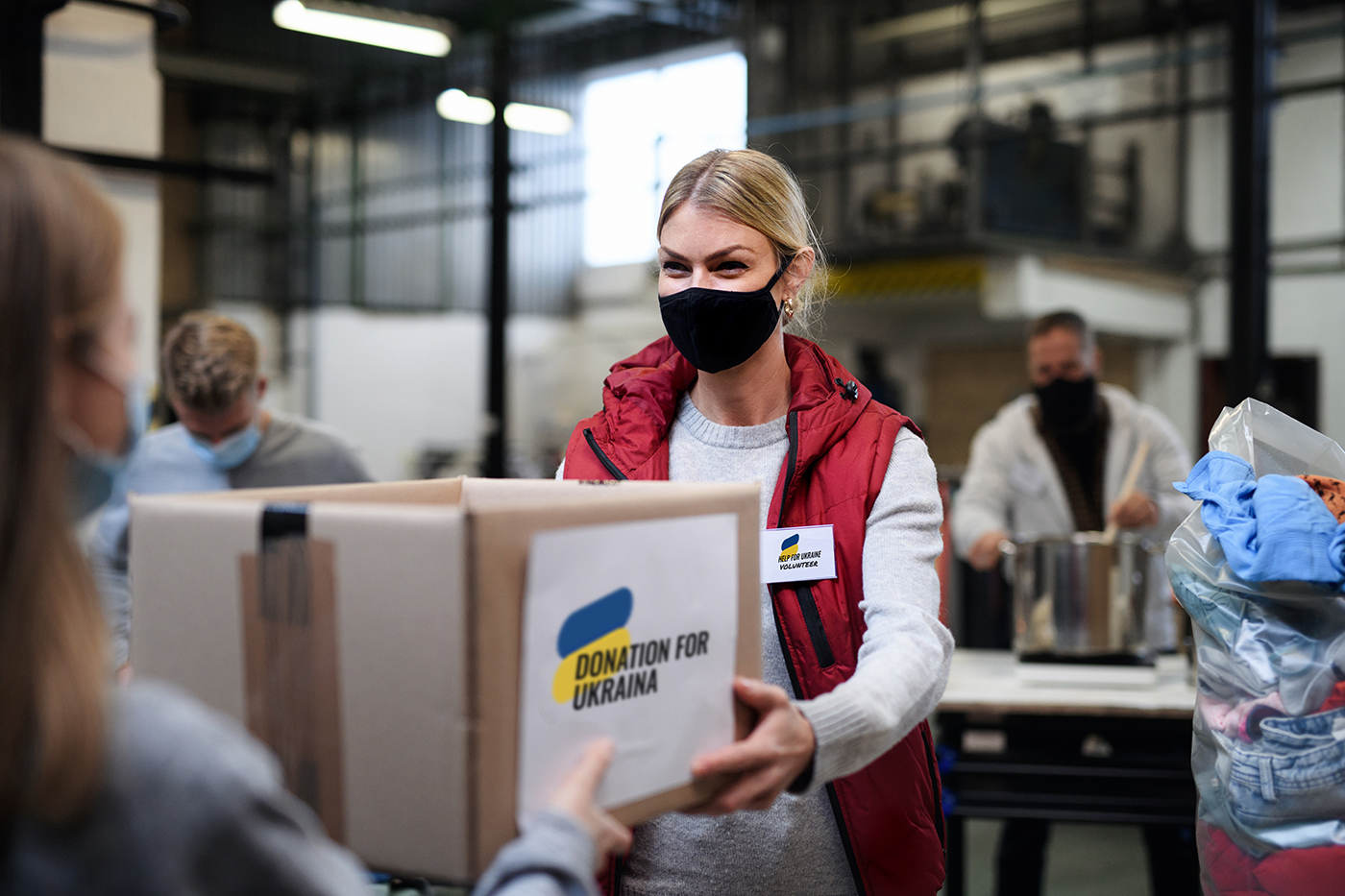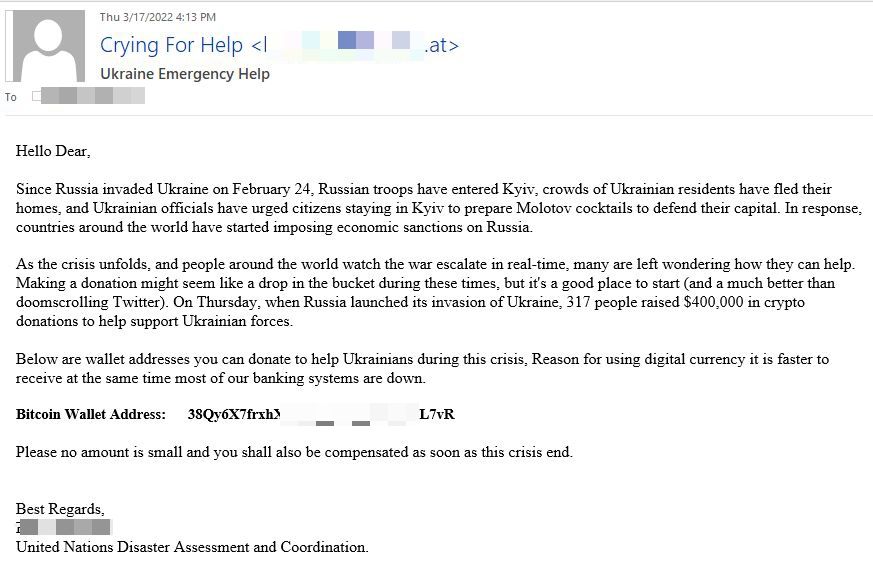
The Russia-Ukraine war: How to avoid charity scams

The fundraising realm is a popular target for scammers looking to take advantage of people’s generosity – and their efforts in light of the invasion of Ukraine are no different.
In this blog, we’ll help you avoid falling victim to charity scams. You’ll get tips on recognising the warning signs to help make sure your donation is going to the right cause. #StandWithUkraine
Table of contents:
- The wave of misinformation
- Red flags you should look out for
- How to make your donations safely
- Think you’ve fallen victim to a donation scam?
The wave of misinformation
As the war in Ukraine intensifies, Ukrainians are being forced to vacate their homes and take refuge in shelters and in neighbouring countries. According to UNHCR, at least 7.3 million people have fled Ukraine, and millions more are displaced inside the country.
Although the war in Ukraine might be miles away from many of us, their plight is triggering an emotional response from nations worldwide who are looking for ways to lend a helping hand to these refugees.
Efforts include making charitable contributions, including booking vacant Ukrainian Airbnbs and donating food, clothes and money.
Unfortunately, this has also created an opportunity for heartless scammers to trick people out of their money, be it through:
- Posing as charities and setting up fake websites and GoFundMe Trust and Safety pages
- Using social media sites such as Twitter, Facebook and Instagram to ask people to transfer money or send Bitcoins and other cryptocurrencies
- Impersonating the Ukrainian government, international humanitarian agencies, UNICEF and donation project organisers such as the Ukraine Crisis Relief Fund, to request financial assistance to ‘help’ the Ukrainian civilians and army
- Spreading realistic video game footage and TikTok live streams mislabeled as coming from the ongoing war
- Creating donation websites that disappear hours after launching. Given the urgency of the situation, this still gives them enough time to exploit people’s generosity
- Sending requests on social media. The scammer might claim to be stuck in Ukraine and need help with travel costs, or even financial assistance to bury loved ones
Red flags you should look out for
Scammers follow the world headlines and work on creating tactics to encourage people to give away their money and personal information. Their go-to rule? Fake it till you make it.
With this in mind, there are signs you should look out for before you make a contribution to any organisation.
On the web and on social media
- Vague claims about where the aid money will go, especially coming from newly established sites that seem to have little or no online presence besides on social media
- Blurry logos in the blue and yellow colours of the Ukrainian flag, making it obvious that the materials have been copied
- Spelling errors that legitimate organisations are unlikely to have made. Make sure to Google the web address or check out their online presence to see if they’re verified
By email
- Long, complex web or email addresses with characters that seem out of place
- Subject lines that play on your emotions or highlight a sense of urgency to encourage you to act immediately. The scammers hope that by reading the email in a rush, you won’t detect any suspicious signs associated with their fraudulent scheme
| 🔍 Those running charity scams don’t only target your money. Some scammers might ask you to share your personal or financial information with them, such as your bank account information or credit card number. This could lead to identity theft. That’s why it’s important that you stay alert when asked to donate your money and do your due diligence to check that your aid will be used for what you intend. |

Image credit: Bitdefender
How to make your donations safely
Choosing the right organisation to donate to can sometimes leave you second-guessing. After all, you know that scam artists can easily hop online and pretend to gather humanitarian aid, only to use it for their own benefit, exploiting people’s hearts and wallets.
Here’s some advice to make sure your donations get where they’re truly needed:
- Take time to research. Before you give to any charity, verify that the organisation you’re considering donating to is legitimate. A good place to start is by checking the Charity Commission register
- Resist high-pressure tactics. Even though the situation is urgent, you should resist the pressure to donate right away. Scammers often insist you do so, causing you to overlook any red flags
- Look for reviews. Search online for the charity’s name and add the keywords ‘scam’, ‘fraud’, ‘complaints’ or ‘review’ to help narrow down whether it’s legitimate or not
- Consider donating directly via the organisation’s website. You should be extra cautious when clicking on links within emails and text messages. These are the preferred method of communication for many scammers who are often good at mimicking those of registered charities
- Be wary of payment methods. Ignore requests to donate by wire transfer, cash, cryptocurrency or through a gift card (keep in mind that charities don’t normally accept ‘gift cards’ as a donation). These payment methods are more difficult to trace and there’s no guarantee you’ll get your money back
- Be careful who you trust. Scammers might approach you on the street or knock on your front door asking for donations. Before you act, ask to see their ID badge and their licence to collect donations
If you want to finance humanitarian aid to help Ukrainian refugees, you can. There are a number of legitimate international organisations that are collecting funds and emergency assistance for Ukraine that you can check out, including:
- The Ukrainian Red Cross Society
- Disasters Emergency Committee
- Save the Children
- Doctors Without Borders
- UNICEF
Think you’ve fallen victim to a donation scam?
While times of crisis bring people closer together, they’re also a magnet for scammers who exploit human kindness and vulnerability. That’s why it’s always important to remain vigilant when donating your hard-earned money to ensure it goes to supporting the right people.
If you think you’ve provided your account details to a charity scammer, get in touch with your bank right away. If you’re with Tide, send us an in-app message, and we’ll help you through the next steps. You can also report it to Action Fraud on 0300 123 2040.
Make sure you always steer clear of the worst kind of scammers by reading the other blog posts in our Keep your business safe series.
Image sourced by Envato elements
Sources used for this article:
- UN News: https://news.un.org/en/story/2022/03/1114232
- Take Five: https://www.takefive-stopfraud.org.uk/advice/general-advice/investment-fraud/cryptocurrency-fraud/
- Bitdefender: https://www.bitdefender.com/blog/hotforsecurity/bitdefender-detects-novel-spam-trends-as-fraudsters-build-repertoire-of-ukraine-charity-scams/
- Charity Commission for England and Wales: https://register-of-charities.charitycommission.gov.uk/charity-search/-/results/page/1/delta/20
All sources checked as of 10 May 2022.






